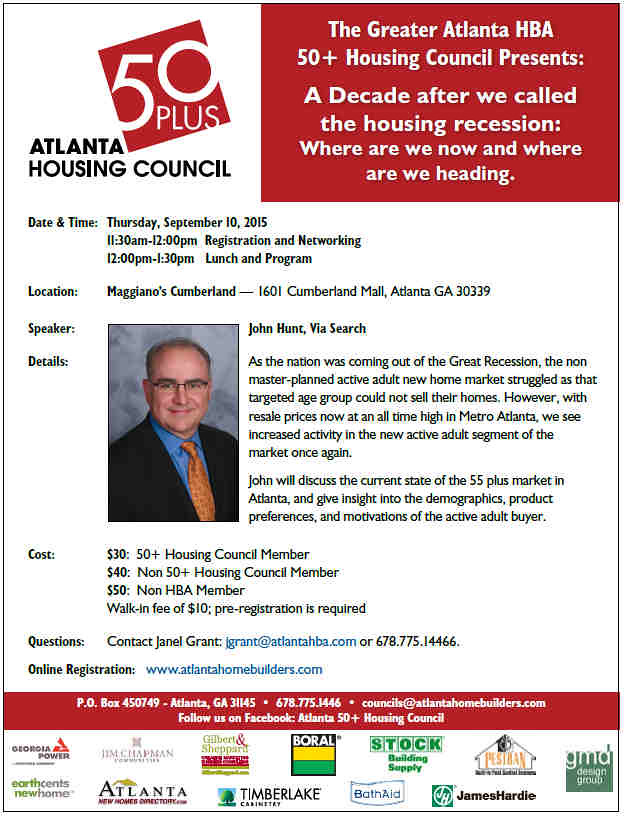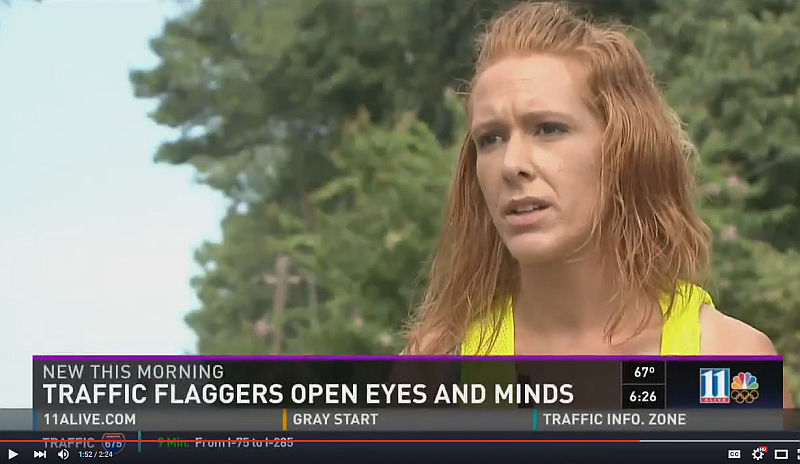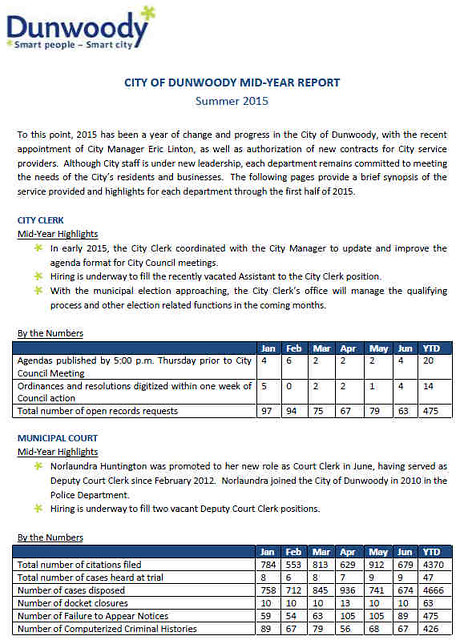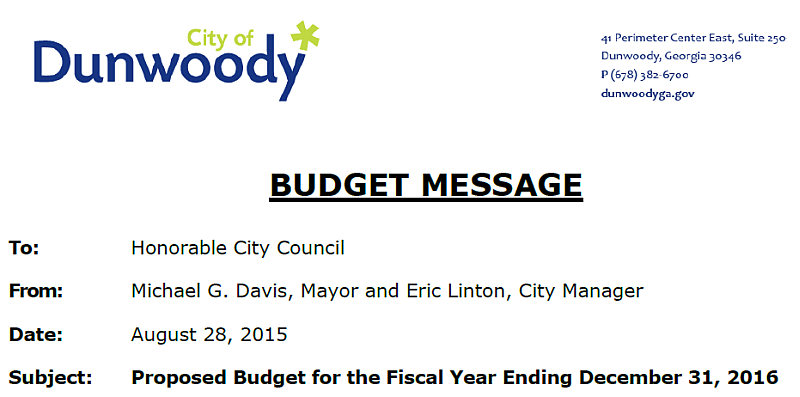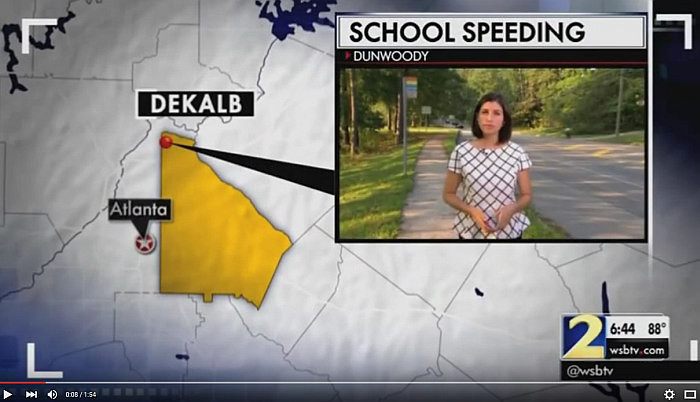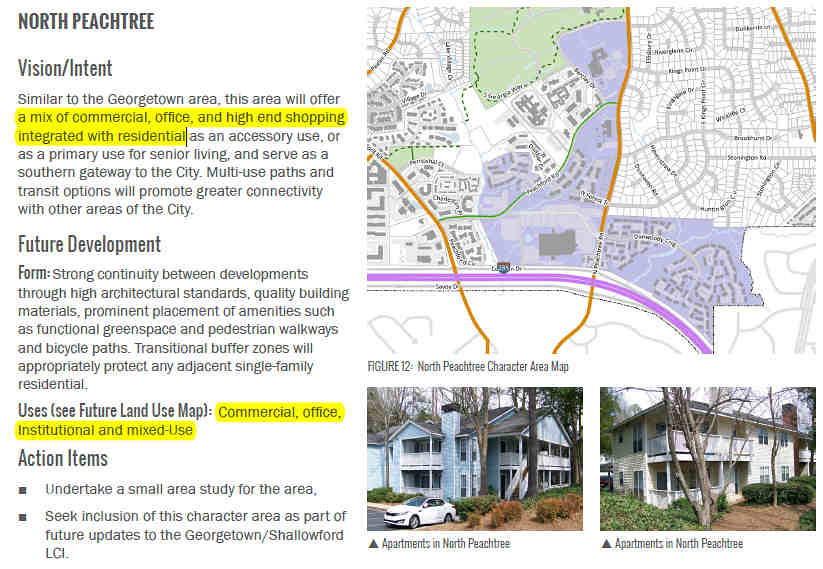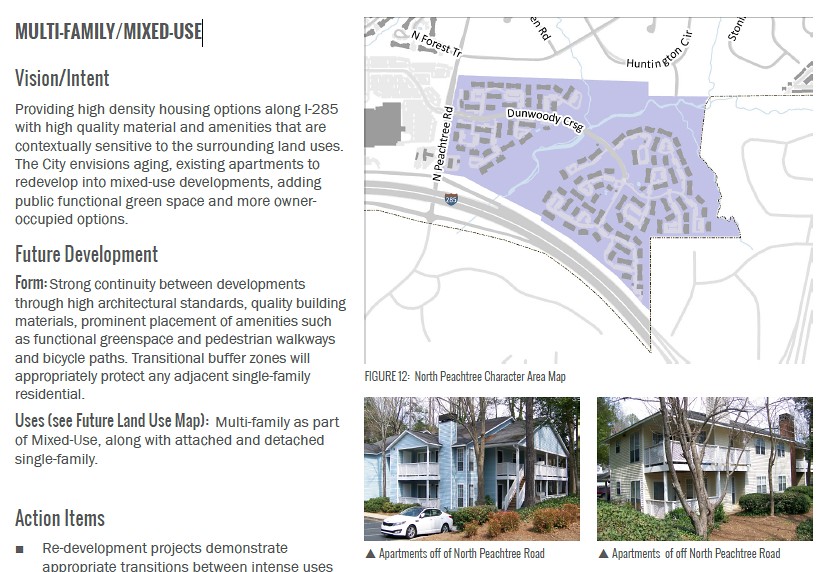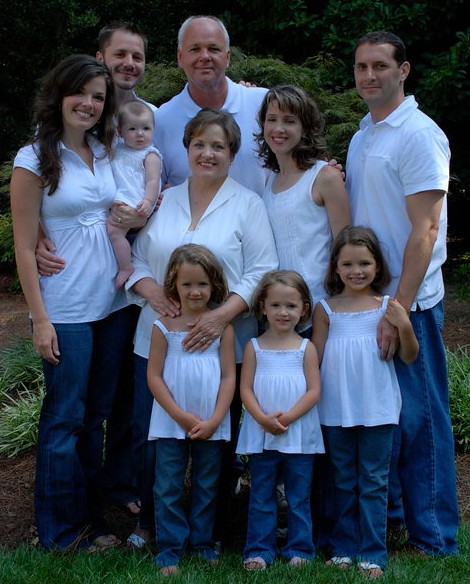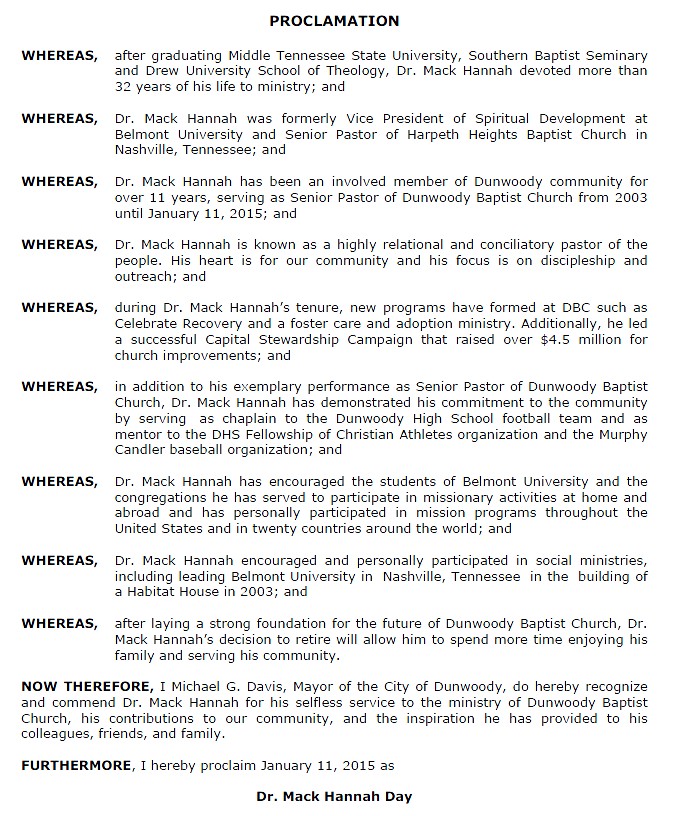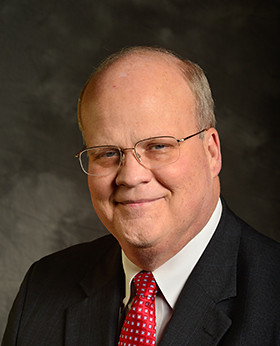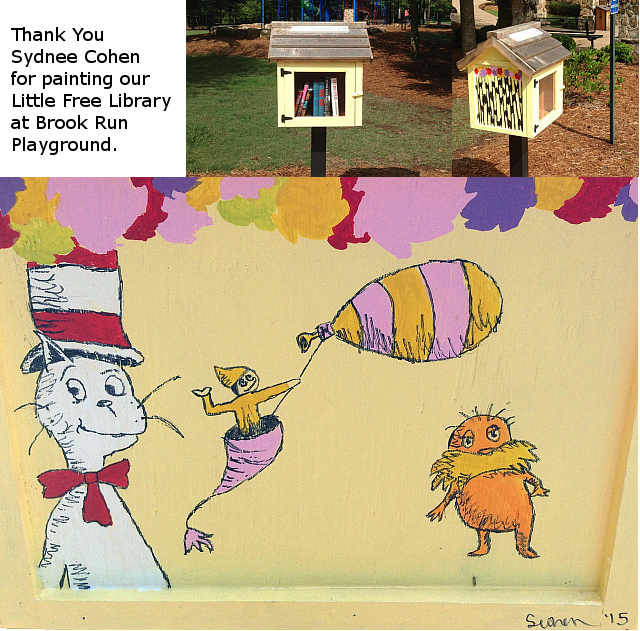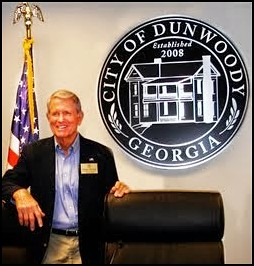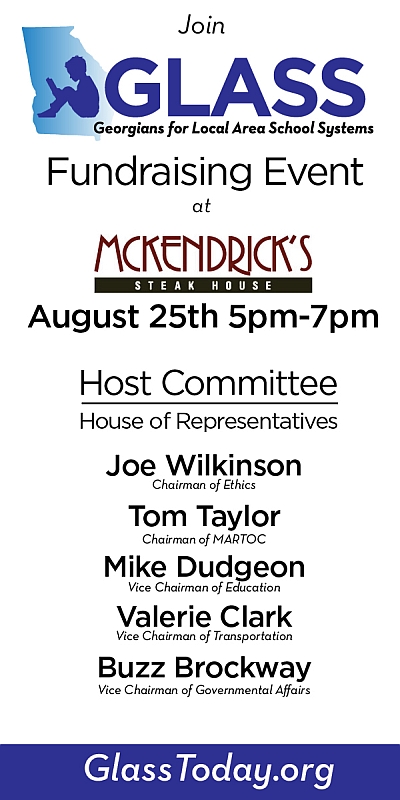Excerpt below - click here for full document.
The list of enhancements to the 2016 budget and their costs can be found on page 35 of the document and I recommend that this be reviewed for both what is there and what is not. It is this list of new items being proposed that the budget committee will need to be determining if appropriate or if other items are missing. The budget committee this year is Lynn Deutsch, Doug Thompson, & Jim Riticher and the first formal hearing has been set for the City Council Meeting of October 12th.
We are pleased to submit the following Fiscal Year (FY) 2016 Budget to City Council and residents for examination and consideration. We encourage citizen feedback and involvement throughout the budget process to facilitate the development of an annual fiscal plan which meets the needs of the City of Dunwoody.
The past six years of cityhood have demonstrated the resilience and fortitude of our city and its residents. Starting out in a time of economic uncertainty and market trepidation, the city strategically moved to establish sound, prudent policies and investments which would help bring services and infrastructure back within acceptable levels. Community safety, public amenities and basic fundamentals, which had been long neglected, began being addressed over time thanks in part to pragmatic fiscal planning and prioritization.
Building upon the experience, achievements and fundamentals from the previous six years, the City of Dunwoody is poised to address the critical needs as identified by city staff and our community while systematically implementing plans with a clear focus on the longer term vision for the City. The FY 2016 Budget represents a distinctive path for progress. The directive contained herein provides opportunities for continuous improvement, carefully nurturing the pillars of stability (safety, infrastructure and amenities) while simultaneously balancing strategies for future success. By continually fine tuning the City’s path for progress, we seek to advance the kind of quality of life attributes which have shaped Dunwoody.
Retaining the fiscally conservative approach which fostered previous success, standards which our residents have come to expect, the FY 2016 Budget forecasts conservative revenue growth. This cautious planning affords the City the opportunity to maintain our original 2.74 millage rate while also aligning expectations for modest revenues from property taxes and new building permit collections.
Overall Economic Condition of the City
The City experienced a rise in the tax digest and slower-paced economic growth in 2015. The tax digest rose just slightly and business licenses are falling short of last year’s pace. The diversity in the City’s revenue streams lessens the effects of this slowed growth. Building permits are strong as a result of business relocations and expansions and hotel taxes are on track to exceed budgeted levels. The City’s overall revenues are anticipated to exceed the $31.7 million in revenues appropriated in the FY 2015 Budget.
The City of Dunwoody continues to operate a lean and efficient model of governing with the Split Contract Service model, outsourcing the majority of government service functions. The Split Contract Service model enables the City to maintain a high level of service for its citizens while maintaining expenditures at or near the level established when the City was incorporated in a down economy. With investments in outside training and internal cross-training, the City works diligently to staff departments efficiently.
Budget Brief
The FY 2016 Budget establishes a systematic approach to implementing plans and appropriately preparing for the future identity and long-term viability of the City. This forward-looking approach symbolizes a Path for Progress, a distinctive set of considerations and principals which can help usher upcoming possibility and achievement. While upholding public safety and the continued implementation of successful infrastructure initiatives are tantamount, the FY 2016 Budget provides an opportunity to invest in what has made Dunwoody a “big-city community with a small-town feel.”
The FY 2016 Budget for all appropriated funds totals approximately $34 million in revenues. The defining Path for Progress elements of the FY 2016 Budget include allocating more than $4.5 million for paving, intersection and sidewalk improvements and specific allocations for long-term enhancements such as a connector road, a gateway augmentation and planning and design of future City Hall.
The FY 2016 Budget includes a $1.6 million transfer in General Fund dollars to pay debt associated with Project Renaissance land purchases. These debt payments will be offset with revenue generated from the sale of lots related to Project Renaissance. Of this transfer, $1.4 million represents an additional principal payment toward the variable rate series of this debt.
The FY 2016 Budget also includes $2.3 million in General Fund transfers and $5 million in HOST Fund transfers to our Capital Projects program for the development of critical city assets, infrastructure projects, and public safety enhancements. The Capital Projects list for 2016 includes street resurfacing, sidewalk construction, intersection improvements, park improvements, and public safety equipment.
The FY 2016 Budget utilizes approximately $25,000 of reserves in the Stormwater Utility Fund to speed up the timing of significant improvements to stormwater infrastructure while maintaining the healthy $3 million stormwater fund reserve for catastrophic stormwater events.
The remaining $25 million in revenue is budgeted for operations and cash reserves. Based on Council policy, the FY 2016 Budget anticipates maintaining a reserve sufficient to cover government operations for four months. The FY 2016 Budget maintains the City’s original 2.74 millage rate and does not anticipate an increase in that rate.
FY 2016 Expenditure Highlights
The city’s emphasis on the “Three P’s”: Police, Paving, and Parks has not diminished and is further supported through the FY 2016 Budget. In order to address the needs of the community and the challenges presented for the future the City has created a FY 2016 Budget list of key expenditures and improvements which clearly demonstrate the focus on the needs of today and the Path for Progress.
Paving / Infrastructure
2016 street resurfacing and paving and sidewalk improvements ($2,500,000)
The Local Maintenance Improvement Grant from the Georgia Department of Transportation represents $300,000 of this total
Construction funding for Chamblee Dunwoody Road bicycle and pedestrian improvements ($1,600,000)
Construction funding for Tilly Mill at North Peachtree intersection improvement ($500,000)
Concept funding for a connector road between the Ashford Dunwoody off ramp and Perimeter Center Parkway ($200,000)
Construction funding for Tilly Mill sidewalk from Womack to North Peachtree ($250,000)
Right Of Way (ROW) acquisition for the Georgetown Gateway Project ($750,000)
Parks
Donaldson Bannister Farm site improvements ($100,000)
Park Surveillance at Georgetown Park & Pernoshal Park ($266,000)
Police Department/Public Safety
Three Patrol Officers, cars and equipment ($395,863)
Detective, car and equipment ($102,154)
Funding for vehicle replacement ($200,000)
End of life replacement for equipment ($211,500)
Average merit-based increase ($248,308)
Community Development
Sign Code Update Project ($25,000)
Permit Tracking Software ($150,000)
Finance & Administration
Facilities Improvement Partnership Program ($250,000)
Planning and design of future City Hall ($250,000)
System upgrades ($39,000)
Stormwater Utility
Street Sweeping ($24,000)
While this is not a comprehensive list of enhancement requests, it does highlight the City’s focus on continued fiscally conservative spending while supporting the primary reasons for becoming a city – namely the local control over safety, infrastructure, and community development to improve the quality of life for all of Dunwoody’s residents, businesses, and visitors.
Issues on the Horizon
In 2015 the City concluded the Request for Proposal (RFP) process to rebid the City of Dunwoody Split Contract Service model by which the City staffs a majority of government service functions. At the conclusion of the RFP selection process, the City decided to bring in-house five formerly contracted positions (Community Development Director, Parks and Recreation Director, Economic Development Director, a part time Economic Development Retention Manager, Human Resources Director and a Human Resources Specialist). These new City employees, along with one new contract service provider chosen from the RFP process presents a change in the makeup of previous staffing structure which will be sensible to monitor and assess for a customer service and performance standpoint.
The economic downturn experienced since 2009 has not yet completely returned Dunwoody revenues to pre-recession peaks and office vacancy rates indicate the economy has not reentered full recovery mode. The potential for rising interest rates and increased construction costs is possible and this could impede borrowing, construction, and development initiatives within the city and region. The City must prepare for general gaps in revenue streams and be mindful of longer-term external factors which may be out of the City’s control but also present issues for prudent economic management.
With future planning and projects being forwarded, it will be especially pragmatic for the City to practice transparency and civic engagement as it moves forward with planning for the design and construction of a City Hall. A City Hall can become a signature facility and a symbol of the character, persona and style of a city and its services. It will be important to work with the community to help determine the best fit, place and design for a government facility. Construction activities, both those performed by the city and those being done by the private sector (i.e. State Farm, Hotel Equities, etc.) may have a tendency to create congestion and deviations in various traffic and business patterns. Also, improvements at the Tilly Mill at North Peachtree intersection will commence in 2015, and carry on into 2016, which could potentially bring additional attention to a high-profile project and heavily trafficked intersection. Construction activity and changes at various locations in the City will need to be monitored and addressed to ensure productivity and efficiency are not compromised.
Elements of the community-developed Parks, Recreation, and Open Space Master Plan; Georgetown/North Shallowford Master Plan; and Dunwoody Village Master Plan each will undergo implementation activities and plan upgrades at different phases in the coming year. The continued revitalization efforts for Georgetown and Chamblee Dunwoody corridor will continue throughout 2016 and residents, businesses and visitors will begin to experience the benefits provided through the program. Appropriate and timely community input will need to be gauged and addresses to ensure project successes and continued redevelopment and growth of these areas as outlined in their respective Master Plans.
Because the City’s lawsuit with DeKalb County wrapped up and settled in 2015, the City is lowering its anticipated legal expenses for 2016. The lawsuit was a leading contributor to the City’s legal preparation and activities and a reduction in this expense may leave the City vulnerable to unforeseen lawsuits.
Summary
Careful nurturing, attention and collaboration with the community will enable the City to address future stability and successful program advancement. A Path for Progress is a longer-term objective which comes to fruition with watchful foresight, contentious planning and vigilant implementation. Through the FY 2016 Budget, the City seeks to continue its delivery of quality customer service based upon a financially responsible and fiscally sound framework and provide deliverable solutions for the community’s vision of a better Dunwoody. We look forward to a collaborative review of the FY 2015 Budget proposal over the next two months and appreciate your thoughtful input throughout the process.
Sincerely,
Michael G. Davis Eric Linton, ICMA-CM, AICP
Mayor City Manager

